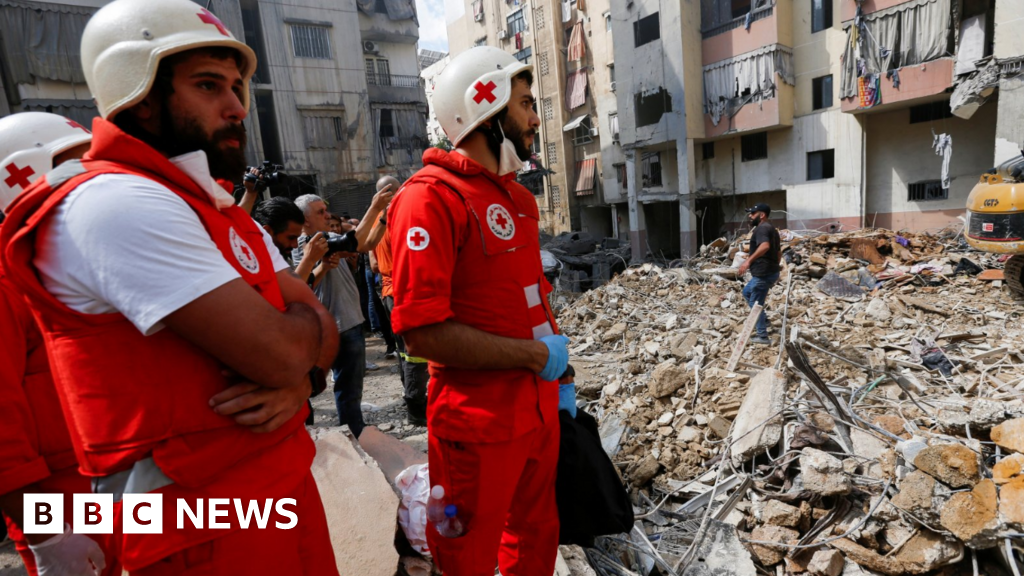Reuters
Medical personnel are working at the scene of Friday’s Israeli attack, and search and rescue operations continued on Saturday.
Lebanese officials said the death toll from Friday’s Israeli airstrikes in Beirut has risen significantly, with several children and women among the dead.
Rescuers searched through rubble throughout the day Saturday after the attack caused a high-rise building to collapse and partially damaged other buildings.
Excavators were deployed to clear rubble as medical staff canvassed the scene and people waited for news of any missing people.
The attack, which struck the densely populated Dahiyeh district south of Beirut and a Hezbollah stronghold, killed at least 37 people, including three children, and injured 68, according to the Lebanese Health Ministry.
The airstrike was Israel’s third attack on the Lebanese capital this year and is seen as a major escalation of tensions in the region that has further raised fears of all-out war. Senior UN official Rosemary DiCarlo warned that the Middle East is at risk of a conflict “far worse” than the devastation the region has seen so far.
Hezbollah, a powerful Iranian-backed militia and political group, confirmed the death of Ibrahim Akil, a senior commander in its elite Radwan unit. The group also confirmed that Ahmed Wahbi, a senior Radwan commander, was killed in the attack.
Lebanon’s Health Minister Firas Abiad said the attack was a “violation of international humanitarian law.”
“The fact is that the children and women who were killed were not Hezbollah members,” he said. “They were civilians who happened to be nearby.”
Reuters
Hezbollah members carry the coffin of Hassan Yousef Abdel Sater, who was killed in an Israeli attack on the southern outskirts of Beirut on Friday.
The Israeli military issued an update on its attack in southern Lebanon on Friday, saying it had killed 12 senior commanders of Hezbollah’s elite Radwan unit.
The Israel Defense Forces (IDF) said those attacked in Beirut were meeting in Dahieh, a known base for Iran-backed groups in the Lebanese capital, and described the attack as a “precise strike.”
In a separate post on X, an IDF spokesman added that the 12 people killed in the Beirut attack were senior members of the Iran-backed group, “top members of the Hezbollah leadership.”
EPA
Lebanon’s health minister said at least 37 people were confirmed dead.
Hezbollah confirmed that in addition to Akil’s death, Ahmed Wahbi, a top Radwan faction official, was also killed in the attack, which hit the densely populated Dahieh district, where the group has a stronghold.
It is unclear how Hezbollah will respond, as it does not want to provoke a broader war with Israel.
Iran, Hezbollah’s main backer, also does not want a major conflict.
But the latest airstrikes came days after a series of explosions of pagers and walkie-talkies used by the group killed dozens, wounded thousands and sparked panic in a country exhausted by nearly a year of conflict.
Dr Abiad said 152 people remained in a critical condition and more than 777 were injured and receiving treatment in hospital following the explosions on Tuesday and Wednesday.
The death toll in the two-day blasts has risen to 39.
Tuesday’s attack left 12 people dead, bringing the death toll to 27 on Wednesday, he added.
Hezbollah leader Hassan Nasrallah on Thursday condemned the attack, saying Israel had crossed “all red lines” and vowed “just punishment.”
Israel has not claimed responsibility for the attack.
The UN High Commissioner for Human Rights, Volker Turk, said this week’s pager and walkie-talkie explosions in Lebanon violate international humanitarian law.
Cross-border fighting between Israel and Hezbollah intensified on October 8, 2023, the day after an unprecedented attack on Israel by Hamas militants in Gaza, when Hezbollah opened fire on Israeli positions in a show of solidarity with the Palestinians.
Since then, cross-border fighting has killed hundreds of people, most of them Hezbollah fighters, and displaced tens of thousands on both sides of the border.
Israel recently added the return of people displaced from the country’s north to its war objectives.
Defense Minister Yoav Gallant said Thursday that Israel was entering a “new phase of the war” and was further concentrating its efforts in the north.



